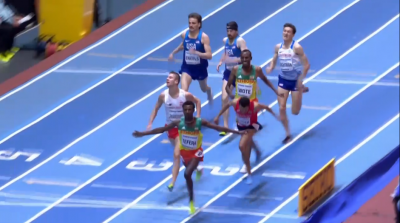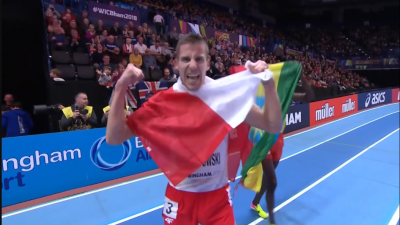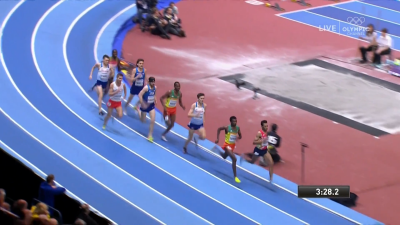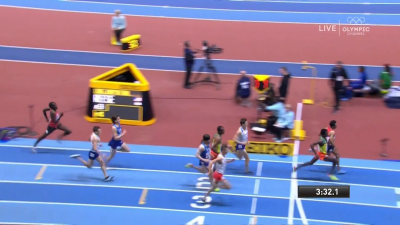Young Ethiopian Samuel Tefera Wins 1500m Gold 36 Days after His First Indoor Race, Blankenship 5th, Engels 7th
By LetsRun.com
March 4, 2018
BIRMINGHAM, England — 36 days ago 18-year old Samuel Tefera of Ethiopia had never run an indoor track race in his life. Now, he is both the world indoor junior record holder and world indoor champion as Tefera won a tactical men’s 1500 this afternoon in 3:58.19 at the 2018 IAAF World Indoor Championships thanks to a 25.9 final lap which finished off a 52.1 final 400 and 1:49.7 final 800.
Tefera passed Morocco’s Adelaati Iguider, the 2012 world indoor champ, midway down the final straight after Iguider had led for the entire final 300 meters. Iguider ended up earning bronze in 3:58.43 , his fourth world indoor medal, as he was passed right before the line by Poland’s Marcin Lewandowski who got the silver in 3:58.39. It was a much deserved first global medal for Lewandowski as he had coming agonizingly close so many times before in his previous six global finals, twice finishing fourth and even once crossing the line in third at the 2014 Worlds in his native country only to be DQd.
Ethiopia’s Aman Wote, the 2014 world indoor silver medallist, ended up best of the rest in 3:58.64 with the US’s Ben Blankenship winning a near three-way battle for fifth in 3:58.89 just ahead of Brit Jake Wightman (3:58.91) and American Craig Engels (3:58.92).
The Race
The race was extremely tactical early as the first 400 was just 75.84. With the pace being so slow, Tefera made a smart move on the turn between 500 and 550 to get up to the front and he’d stay in first or second for the rest of the race. After 800 was reached in 2:23.68, things finally got going a little bit as each every lap from there on out would be a sub-30.
Iguider went to the lead just before 1200 (3:19.54) but Tefera quickly accelerated to protect his second position from Wightman and at the bell, the top two had 1-2 meter gap on the rest of the field which consisted of Wightman, Wote, Lewandowski and Blankenship being very closely bunched and nearly four abreast.
Iguider led until midway down the final stretch when he began to tie up and Tefera powered ahead to gold. Would Iguider hold on for silver? No, Lewandowski got him at the line.
Analysis below results.
| POS | BIB | ATHLETE | COUNTRY | MARK |
|---|---|---|---|---|
| 1 | 214 | Samuel TEFERA |  ETH ETH |
3:58.19 |
| 2 | 341 | Marcin LEWANDOWSKI |  POL POL |
3:58.39 |
| 3 | 310 | Abdelaati IGUIDER |  MAR MAR |
3:58.43 |
| 4 | 216 | Aman WOTE |  ETH ETH |
3:58.64 |
| 5 | 403 | Ben BLANKENSHIP |  USA USA |
3:58.89 |
| 6 | 242 | Jake WIGHTMAN |  GBR GBR |
3:58.91 |
| 7 | 414 | Craig ENGELS |  USA USA |
3:58.92 |
| 8 | 236 | Chris O’HARE |  GBR GBR |
4:00.65 |
| 9 | 295 | Vincent KIBET |  KEN KEN |
4:02.32 |
Quick Take: Does Ethiopia have a legit 1500 star?
In it’s proud history of athletics, Ethiopia hasn’t been known for its 1500 meter prowess. While this wasn’t Ethiopia’s first-ever World Indoor gold at 1500 – the great Haile G won indoor gold in 1999 and Deresse Mekonnen won indoor gold in 2008 and 2010 – Ethiopia has never won an outdoor gold at Worlds or the Olympics. In fact, this may be hard for you to believe but they have won only one outdoor medal of any color in the men’s 1500 at the Worlds or Olympics – Mekonnen won silver in 2009.
That outdoor stat may change as Tefera certainly looks great on paper. With a listed age of 18, he earlier this winter set a new world indoor junior record of 3:36.05. Last year he was the winner in Hengelo in 3:33.78 in the first non-Ethiopian race of his career in a race that served as the Ethiopian trials for Worlds. There was one big hiccup at Worlds – he flamed out in the first round at age 17 – but hasn’t lost since as he won all three of his races including this one this winter.
Quick Take: With better tactics could Lewandowski have had gold?
In a slow race, there is a huge advantage to being near the front when the kicking starts. Tefera was always right on the lead the final stages of the race. Lewandowski was not and with better tactics he may have had the gold. At the finish Lewandowski was .20 behind, Tefera. At the bell he was .2-.3 behind him, so he closed just as fast or faster than Tefera the final 200m (unfortunately the IAAF doesn’t publish automatic splits for everyone). And Lewandowski had to make a HUGE move to get that close to the lead at the bell. Here he is at 330m to go:
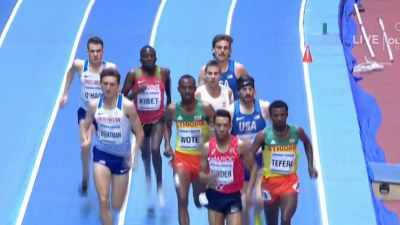 Lewandoski in middle of pack with 350m to go
Lewandoski in middle of pack with 350m to go
And here he is atop the straight prior to the bell:
Here he is at bell
Quick Take: Ben Blankenship on why today’s race went so slow: “Do you want to lead it?”
Blankenship had pretty good position for most of the race, but when a race goes this slow, it’s extremely difficult to stay in good position for the entire race. Blankenship was put in a tough spot as the bell as Lewandowski came steaming around on his outside. At that point, Blankenship could either have shifted to top gear to try to hold off Lewandowski or let him go by and see himself shuffled further back in the pack.
Blankenship did try to hold position, but unfortunately for him, Lewandowski’s move was too strong and he wound up losing that battle. That left Blankenship with a lot of work to do on the last lap, and he never found the room to make a concerted kick for a medal.
“I was pretty comfortable all the way to the finish, just didn’t have any real room to run,” Blankenship said.
We asked Blankenship why this race was so slow, and he responded by asking us, “Do you want to lead it?”
“I think it’s really tough,” Blankenship said. “I think anytime you go out and lead a World final, unless you’re head and shoulders better than the rest, you’re gonna be eaten alive.”
If the pace is fast, that is true. But in a race like this, we disagree. In a super slow race, positioning is crucial and by leading, you give yourself the best position of anyone in the field. That’s how Matthew Centrowitz won gold in a 3:50 race in Rio two years ago. The one drawback is that if you are in the lead of a slow race at halfway, you still have to be prepared to answer any moves from that point on or risk sacrificing your greatest advantage (positioning). If you come from behind, you have worse position, but can choose when to move rather than responding to others.
Speaking of Centrowitz’s gold, it’s interesting to compare the splits of that tactical race with this one. They both featured a 55 second third 400 and a 38 second last 300.
| 2016 Rio Final 400 – 66.83 800 – 2:16.59 (69.76) 1200 – 3:12.00 (55.51) 1500 – 3:50.00 (38.00) Centro’s last 400: 50.6 |
2018 Worlds Final 400 – 75.84 800 – 2:23.68 (67.84) 1200 – 3:19.54 (55.86) 1500 – 3:58.19 (38.65) Tefera’s last lap 52.1 |
Quick Take: This meet was a learning experience for Craig Engels
Engels didn’t run great in yesterday’s prelims, but he made it to the final. Today, he was presented with a very difficult scenario in his first global final. When the pace is as slow as it was today, it’s very hard to be in good position as only a few guys can be in a good spot at any given moment, and those positions can change almost instantaneously.
The good news is that Engels is only 23 years old. The more chances he gets to experience different race scenarios, the better he will do when faced with those scenarios in future championships.
Quick Take: Jake Wightman feels he should have done better today
Wightman was all over the place in this one and had to run a lot of extra distance. His plan was to make a move with 300 to go if the race had been a bit faster, but he was forced to adjust when it went slow. At the bell, Wightman was in pretty good position, but he he had already spent a lot of energy (both mental and physical) just to get to that point.
“I didn’t deal with it very well, I don’t think,” Wightman said.
Quick Take: Chris O’Hare decided to race after his MRI came up clear, but he was a shell of himself
O’Hare ran great at Millrose and in Boston earlier this year, and would definitely have threatened for a medal at 100%, but after yesterday’s prelim, it was clear he’s not the same guy right now with his foot injury. Credit to O’Hare for being tough and going out and racing a World Championship final.

